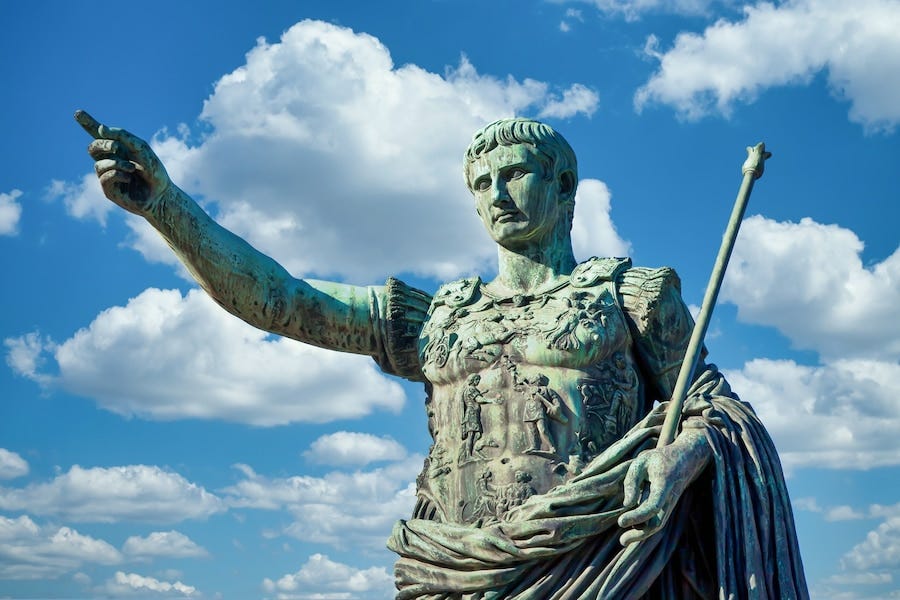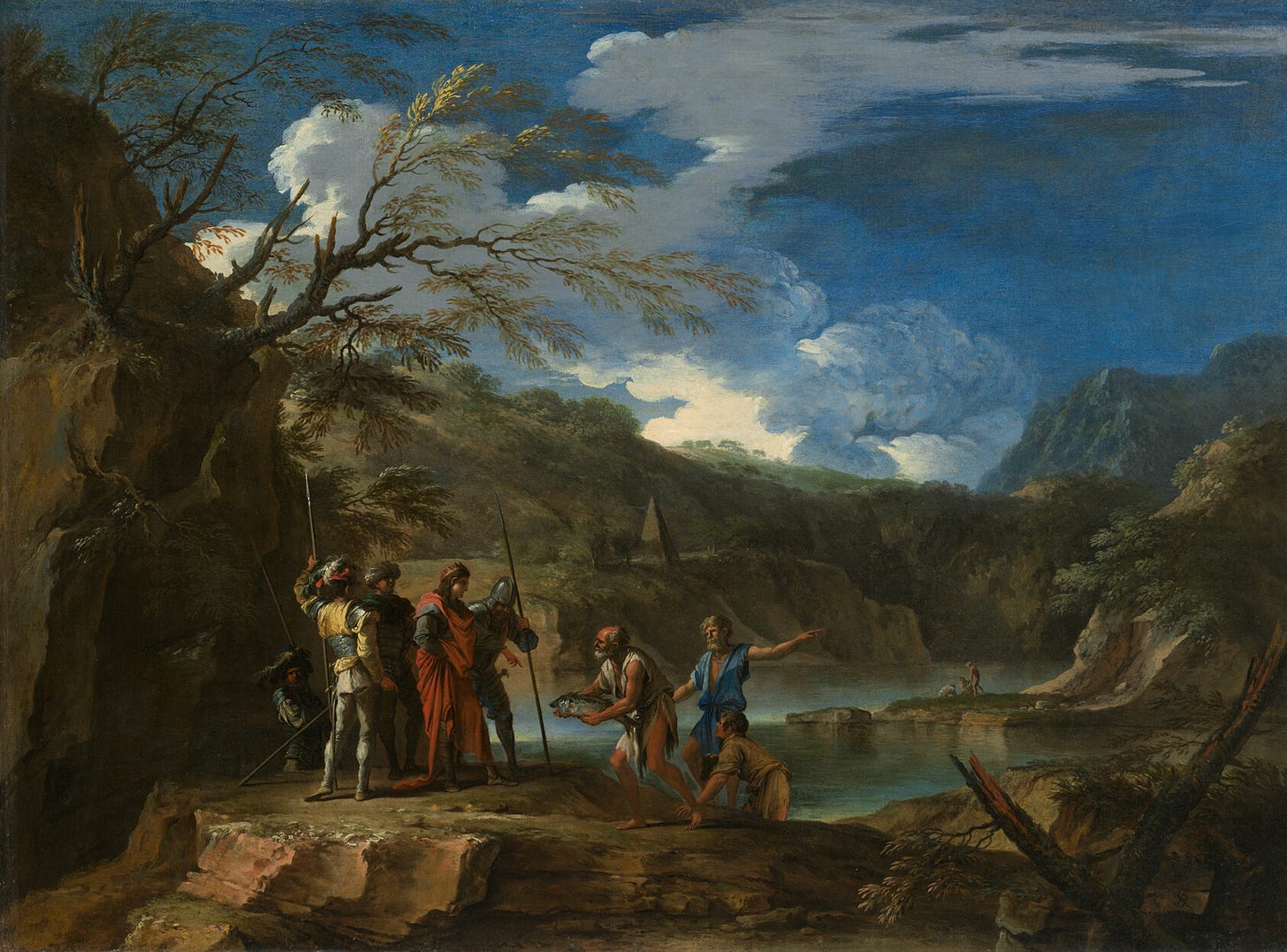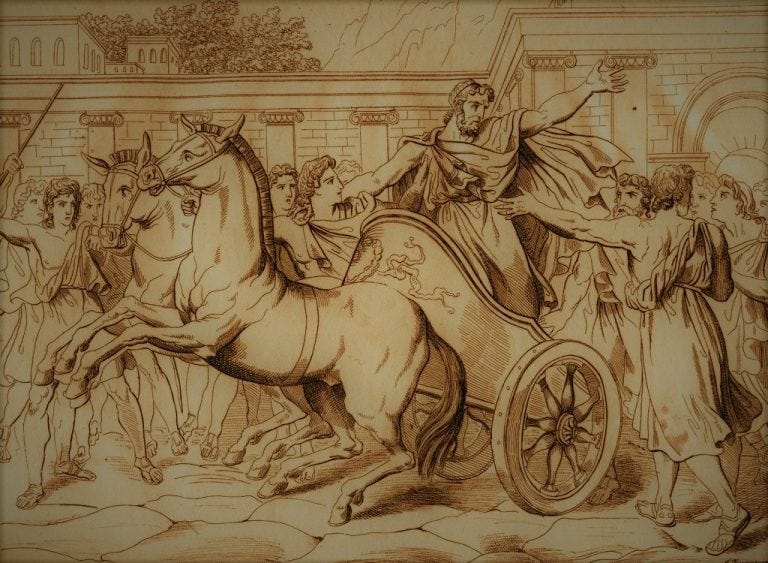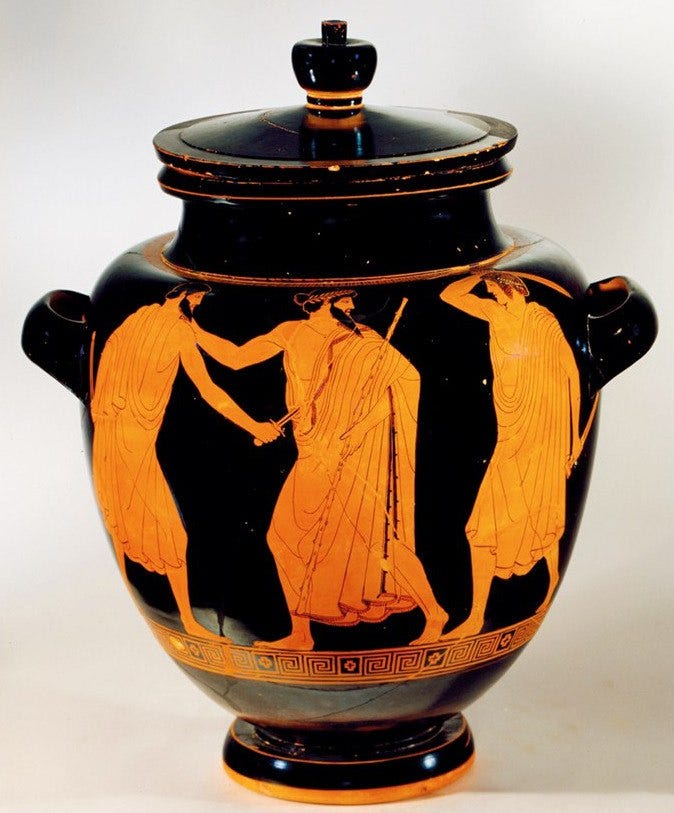
Dear Classical Wisdom Reader,
History is full of contradictions.
Or at the very least, what seems like contradictions to modern eyes.
We can believe something to be so self evidently true, that it’s borderline inconceivable that it wasn’t always the case. Yet as Heraclitus tells us, all things are always changing. After all, “You can’t step in the same river twice.”
One way this is felt is through language, and the different ways the meaning of words can shift over time.
So today we’re looking at how the understanding of what a ‘tyrant’ is has changed substantially over history.
It turns out, being a tyrant might not always have been considered such a bad thing!
Read on to find out more about the surprising history of this very charged word…
All the best,
Sean Kelly
Managing Editor
Classical Wisdom
Keep the Classics Alive! To receive new posts and unlock Classical Wisdom’s Resources, consider becoming a subscriber today:
The Times of Tyranny
by Ben Potter
The lead-up to the Second World War was often referred to (in its own time) as the Age of the Great Dictators.
The idea being that, even though the fledgling American experiment was going rather well, not all democracies were pulling their weight in the war of ideologies.
Emerging dictatorial governments in Spain, Italy, Germany and Russia were getting their respective nations back on track as Europe strived to recover from its self-destructive, turn of the century warmongering.
The fact that these were dictators, men of the people, for the people, instead of privileged, hereditary monarchs in charge of the ship of state seemed like a natural and sensible step in the right direction.
Though I hear the cry going up from all corners of cyberspace: “Quit stalling. What’s this got to do with the Classics?”
Prey beat still, impatient hearts.
The point is that, as hard as it is for us to imagine now, dictatorships haven’t always been seen as ‘bad’. It was only after the fact that it was considered to be an undesirable form of government, regardless of the personnel involved, and universally reviled throughout civilized parts of the world.
And indeed this was true also in the ancient world.
Though it should be stressed that between then and now someone left a red sock in with the ‘dictatorship’ wash and what came out in the end wasn’t exactly what went in.
For Romans, a dictator (‘one who leads’) was a politician/general, a magistratus extraordinarius, who was given temporary, and not quite absolute, power to perform a specific task, e.g. putting down a rebellion.
But such a power was considered too dangerous to grant for any conflict outside Italy, as a dictator would then be able to do as they pleased away from the beady eye of the Senate.
Thus, as Rome expanded her empire and the Italian peninsula became a land under no imminent threat, dictatorship fell by the wayside.
Though in 83 BC, after a 120-year hiatus, the victorious general Sulla revived the power for a single year before retiring from public life. The purpose of this was to re-codify the constitution following a series of civil wars.
This move was roundly mocked by the next man who took up the dictatorial gauntlet… Gaius Julius Caesar.
As it became increasingly obvious that Caesar was not only the dominant figure following the civil war of the 40s BC, but a cunning and ruthless politician as well as a fine military strategist, the Senate deemed it expedient to appoint him dictator… and dictator again… and then dictator for ten years… and finally, dictator for life.
However, life didn’t last very long, only until 15th March 44 BC, or the Ides of March.
Despite going on to take many further powers and titles, Octavian Augustus, the first truly absolute ruler of this new Rome, did not dare to call himself ‘dictator’; the word had by then become poisonous.
And while the Romans had a long history of viewing tyranny as an unpleasant form of government (hence the Republic), it wasn’t that way in pre-Classical Greek thought… and the memory of past Tyrants is illustrative of this.
For example, Cypselus, a tyrant of Corinth who came to power in 657 BC after ousting an aristocratic family, was a popular and dynamic leader who consolidated Corinthian interests abroad and made Corinthian pottery dominant in the Greek marketplace.
Cleisthenes ruled Sicyon from c.600-560 BC and is remembered best for his enduring tribal reforms rather than anything insidious.
Polycrates of Samos (ruled c.538-522 BC) was a popular and enlightened tyrant about whom Herodotus speaks well. His public building works included aqueducts and temples which reflected both his benevolence and piety.
Herodotus also suggests he may have been pretty humble (well, for a tyrant anyway). Supposedly he threw his prized possession, a bejeweled ring, into the sea in the hope of avoiding the hubris of the overly successful. However, ill-omen struck when a fish turned up with the ring inside it.
Maybe not surprisingly, it was in Athens, the bastion of enduring Greek thought, that tyranny finally developed the stigma it has today.
Though, again, this was not initially the case.
Peisistratus, a relative of the much-lauded lawgiver Solon, initially managed to install himself as tyrant in 561 BC, but was only able to make the title stick in 546 BC.
From that point on a string of populist and cultural policies helped to underpin his power.
He initiated a public building program, extended or created festivals (including the dramatic festival, the Dionysia and an Athenian ‘Olympics’, the Panathenaic Games), codified the works of Homer and championed the causes of peasants and landowners.
Indeed, Peisistratus was considered a model tyrant with almost no connotations of the violent oppression the word conjures up.
Aristotle said of him: “his administration was temperate… and more like constitutional government than a tyranny”.
This is high and significant praise indeed, as Aristotle and Plato helped to popularize the idea that tyranny was a base and unsatisfactory form of government in and of itself.
Moreover, Peisistratus had that luxury so few tyrants enjoy, to die a peaceful death. Though the same cannot be said of his son and joint-heir, Hipparchus.
He, along with his brother Hippias, continued their father’s work, but were met with strong opposition in the form of Harmodius and Aristogeiton, the original Tyrannicides.
These men succeeded in killing Hipparchus in 514 BC, but Hippias escaped the assassin’s blade.
Hippias’ sole reign was, perhaps unsurprisingly given the circumstances, violent and oppressive and many believe he became the source of all our negative connotations associated to the word ‘tyrant’.
For the Athenians this was certainly true.
Fortunately Hippias was removed from power in 510 BC, allowing the noble Cleisthenes to initiate the reforms that gave birth to Athenian democracy.
Tyranny never recovered. From this point on merely accusing someone of being tyrannical was enough to slur them, it was no longer necessary to state why that was the wrong way to be.
Thus a few final words on the pitfalls of such a form of government shall be given to the two men who, perhaps, did more than any other to show that tyranny’s dark underbelly was more than merely suspicious, but destructive and pernicious.
And here I’ve saved the best, or at least most alarming, quote for last:
“The tyrant must be always getting up a war… in order that the people may require a leader.” – Plato
“Tyranny is a kind of monarchy which has in view the interest of the monarch only.” – Aristotle
“A tyrant, as has often been repeated, has no regard to any public interest, except as conducive to his private ends; his aim is pleasure.” – Aristotle
“Dictatorship naturally arises out of democracy and the most aggravated form of tyranny and slavery out of the most extreme liberty” – Plato
Classical Wisdom is a reader-supported publication. To receive new posts and support the Classics, consider becoming a free or paid subscriber.
Más info en frasco@menadelpsicologia.com / Tfno. & WA 607725547 Centro MENADEL (Frasco Martín) Psicología Clínica y Tradicional en Mijas Pueblo #Psicologia #MenadelPsicologia #Clinica #Tradicional #MijasPueblo
*No suscribimos necesariamente las opiniones o artículos aquí compartidos. No todo es lo que parece.




No hay comentarios:
Publicar un comentario